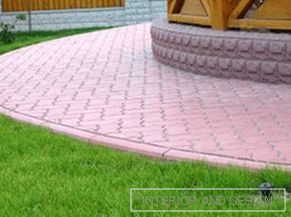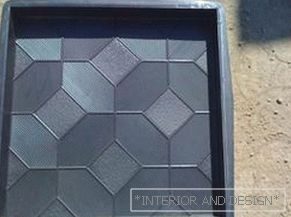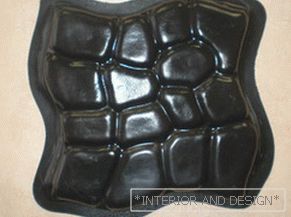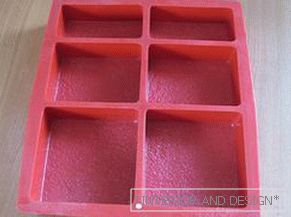 Buy a plot of land, build a house on it - this is still half the battle. In order for your country estates to please you, and you would like to spend all your weekends and holidays in the country, it is absolutely necessary to equip the territory of your site. And in this issue can not do without paving slabs, which has special strength and durability. This material is used in the blind area of suburban buildings, in arranging a recreation area where a gazebo, garden swings, chaise lounges, etc. are to be placed; when laying garden paths; they are being dragged out of the area in front of the house and the parking place of the car.
Buy a plot of land, build a house on it - this is still half the battle. In order for your country estates to please you, and you would like to spend all your weekends and holidays in the country, it is absolutely necessary to equip the territory of your site. And in this issue can not do without paving slabs, which has special strength and durability. This material is used in the blind area of suburban buildings, in arranging a recreation area where a gazebo, garden swings, chaise lounges, etc. are to be placed; when laying garden paths; they are being dragged out of the area in front of the house and the parking place of the car.
To make your site different from many neighboring ones, and to compare favorably with them, you can try to make original tile yourself. Production is not as difficult as it may seem at first. Only raw materials are needed for the preparation of concrete, forms where it is poured to get the tile, and knowledge of the technology of the production process. Everything, you can get down to business.
Content
- 1 Forms for the manufacture of tiles
- 2 Mold making materials
- 3 How to choose quality forms of plastic?
- 4 Making molds yourself
Forms for the manufacture of tiles
Today in the construction industry applies great diversity paving slabs. By laying method and form it is conditionally divided as follows:
- universal (in other words, paving stone);
- rectangular and square;
- free form;
- modular;
- eco-friendly;
- tile with a castle connection.
По способу производства плитка бывает двух разновидностей: cast и прессованная. Pressed very difficult to manufacture, the process of its production is possible only on special equipment with serious financial investments. At home, this method is difficult to manufacture paving tiles. But cast Tiles with the help of special forms may well be made independently by any householder for arranging your own manor.
It has already been noted above that the production of paving slabs at home requires availability special forms where concrete is poured. These forms can be purchased at a specialized shopping center, you just need to navigate in their quality and value.
Mold making materials
 So, the forms for casting tiles can be:
So, the forms for casting tiles can be:
- Rubber. However, this is currently an outdated technology, since rubber forms are expensive, which is due to the constant increase in the cost of raw materials for their production, and they are difficult. They require the availability of additional equipment in the form of a vibrating table, costly, shelving for drying cast forms, special shields for carrying the forms on the shelves. To reduce the cost of rubber, its manufacturers increase its share carbon black (soot). With the increase of this additive rubber products become less quality, including forms for tiles, which emit soot in concrete. From this product become dark, less attractive externally, they do not have the proper gloss. The strength of such forms also becomes worse; they serve only a few months and become useless, without justifying the cost of acquiring them.
- In addition to all the above, rubber forms require treatment with hydrochloric acid at the end of each production process, which in itself is very unhealthy working and very expensive. However, if you do not fulfill this condition, the finished products will turn out to be porous, and therefore, low-quality. Anyway, before buying a form of rubber, you should think carefully about the feasibility of such an acquisition.
- Silicone. It should be noted that this is the most popular form of form for the production of paving slabs, because the forms of silicone are elastic, easy to use and allow you to transfer the smallest details to the material produced. However, it is worth noting that silicone molds are unsuitable for the production of a large number of tiles, since they do not have sufficient strength for this and at the same time are expensive. That is, they in the mass production of concrete products will quickly fail and the cost of their acquisition will not pay off. Hence the advice: it makes sense to use silicone molds only if they are self-made for the production of a limited exclusive set of tiles that mimic, say, a rare kind of natural stone that you plan to use for garden path decoration.
- Fiberglass. Forms of this type are traditionally used in the manufacture of large plates or in the manufacture of any volumetric products, for example, animal figures for landscape design. It is worth noting in this regard that the forms produced today from this material don't answer necessary requirements: have distorted geometry, require lubrication before each use, and this causes the appearance of pores, often even shells and the lack of gloss. After removal from the form of such products sometimes need to be improved, do not have external attractiveness. If we take into account all the above circumstances, the fact of the rare use of this type of forms for the production of paving slabs is quite reasonable.
- Plastic. The most common in the use of modern forms, suitable for the mass production of high-quality tiles. They have several varieties, the advantages and disadvantages of which will be dealt with below.
How to choose quality forms of plastic?
 Quality plastic molds for the manufacture of paving slabs depends on the source material in their manufacture, as well as on the manufacturer, since every manufacturer uses its raw materials. It may be:
Quality plastic molds for the manufacture of paving slabs depends on the source material in their manufacture, as well as on the manufacturer, since every manufacturer uses its raw materials. It may be:
- Primary polyethylene. Forms from this material have a large number of stiffeners, they have the correct geometric shape, compare favorably durability and the absence of deformation and cracks. According to experts, such forms can withstand up to 1000 concrete fillings.
- Secondary copolymers. It should be noted that the tiles made with the help of these forms are distinguished by perfect geometric outlines and clear patterns. These forms are able to withstand up to five hundred manufacturing processes. However, it should be borne in mind when buying such forms that often an unscrupulous manufacturer under the guise of copolymer "pigs" sells less quality, made from recycled materials. Of course, in this case, you will acquire unsuitable forms for production. In order not to be mistaken, be careful: quality blanks have characteristic brilliance and do not pop under compression.
- ABS plastic. Not a very good option blanks, because the tile as a result is obtained without clear contours, which creates difficulties in its installation, and during the process of production of tiles there are difficulties: frozen products are difficult to pull out of the forms due to the deformation of their edges.
- PVC film. This material is not very strong, so the forms can withstand only up to fifty fillings, however, this is a good indicator for home production, especially considering that the cost of this type of form is very democratic.
- Polystyrene polymer granular. Ideal for home production forms, capable of producing tiles up to one hundred times, having provided ideal geometry and a glossy surface to products after two days.
As a result, it should be noted that before you purchase forms, you need to familiarize yourself with the certificate for them, which should indicate what raw materials were used for their production. The cost of plastic forms varies from 25 to 60 rubles per item, depending on the source material.
Making molds for yourself
 In addition to the option of acquiring "blanks" for casting tiles in finished form, there is the option of making them own hands, which is quite feasible. It can be:
In addition to the option of acquiring "blanks" for casting tiles in finished form, there is the option of making them own hands, which is quite feasible. It can be:
- Wooden forms. They are not only rectangular in shape, but also any other, provided that the manufacturer has the skills of working with wood, since careful adjustment of the corner joints is required for tightness. The material for the form in this case will serve planed board or moisture resistant plywood. The desired form is knocked together in the form of a box without a bottom and is mounted on a rubber mat. For tightness, the gap between the mold and the mat is sealed with foam or silicone. Then a concrete solution is poured into it, and it remains to wait for it to solidify completely.
- Metal blanks. A fragment of a pipe of the desired diameter and height is quite suitable for use as a form for making tiles. Similar to wooden "blanks", they can be installed on both smooth and patterned surfaces, depending on your wishes. Do not forget to only lubricate the workpiece from the inside before using waste oil.
- Plastic molds. For the manufacture of such forms, we pre-manufacture a wooden frame for pouring molten plastic. Each part of the frame must be three centimeters longer than the finished product of paving stones. The frame is fastened with metal corners and self-tapping screws. The second frame is made in an identical way, only its size is completely must match size of future paving slabs. We combine both frames, and fill the gap between them with molten plastic. Letting the form completely harden, remove the frames. Form for pouring concrete ready.
- Silicone forms are made in the same way.



